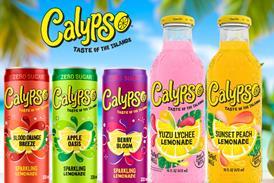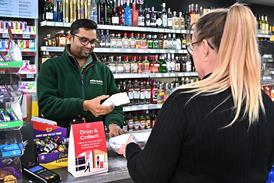When a fly-on-the-wall TV documentary highlighted the scale of shoplifting at his store, Errol Ballin decided he had to take steps to curb the crime. Rich Airey finds out more
Independent retailer Errol Ballin has never been blind to the problem of shoplifting at his store, BRB Supermarket, in Easton, Bristol. His eyes were truly opened to the extent of the problem, however, when he recently agreed to
participate in a TV documentary focusing on retailers' daily battle to cope with the crime.
Errol says the programme, Shoplifters - Caught on Camera, which aired on ITV at the end of last year, revealed the problem was far more widespread than he had thought, and better staff training was the way to get it under control.
During the making of the documentary, expert store detectives set up a base in Errol's back office and were able to keep a constant watch on CCTV screens for would-be thieves - something Errol rarely has time to do himself. The results were shocking, not just because of the amount of shoplifting going on, but also because the programme caught a number of thieves whom Errol had previously thought he could trust.
Since the visit, Errol and his wife Illet have introduced a more
systematic approach to staff training and all staff have been put through a rigorous hands-on programme on how to spot potential criminals. It's an unfortunate state of affairs, but Errol has had to teach all his staff to view every customer as a potential shoplifter.
"The programme focused my mind on the scale of the problem," he explains. "We felt we had always been vigilant, but we decided it was necessary to retrain all our staff. All new employees are also fully briefed on how best to spot shoplifters. It was something we had done in the past, but it wasn't as structured as it is now. I use my own experience and talk employees through the various techniques shoplifters use, such as distraction."
Errol has implemented a ban on prams and pushchairs being wheeled round the store, which he admits doesn't always go down well but is necessary. "We also ask people not to wear rucksacks and tell our staff not to offer change, as this is a typical distraction technique. We don't want to have to take such measures, but we have to protect our business."
While Errol will often ban
shoplifters from his store, many will inevitably attempt to return, often resulting in heated confrontations. "We receive many threats when we catch or confront people," he says. "It's usually verbal abuse, but
accompanied by real physical threats to myself or my staff."
Errol is quick to add, however, that most of his shoppers are great. "Most people are very encouraging," he explains. "The problems arise because in all communities there are a few bad apples. It's because of the good customers that it's all worthwhile. We're a real community store. Some customers will come in three or four times a day. They might not spend much each time, but they are loyal. Some customers will help out by calling me or knocking on the office door if they see someone is stealing something."
The situation was a lot worse when Errol first moved to the area six years ago. "When we took this site on it was completely derelict and the area was really quiet," he says. "People told me I shouldn't bother. But now the street is buoyant and we're
beginning to see the investment was worth it. We're now just where we should have been a few years ago."
In order for the area and his business to continue improving, however, Errol says the system for dealing with shoplifters has to improve also. "We call the police in most times and they'll take the offender away and charge them, but that's usually the last we hear about it," he says. "I'm not confident that there's ever anything done much beyond that."
He wants to see the local police and the courts take a more consistent approach to dealing with business crime.
"The police presence is pretty sporadic," he says. "Every so often they'll have a clean-up operation, but then we don't see much of them for a few months. I get the feeling the police often think shoplifting is too trivial to be taken seriously and that they have better things to do. They may have to deal with a drugs problem in the area, but what they forget is that people often fund their habits by stealing from my store."
Errol tells of how he instigated a meeting with officers in his area through the local business development agency, after a large group of youths chose the front of his store as a hangout, intimidating staff and customers. He says that while the youths were eventually moved on, the communication with the police was poor and he was left wondering if the problem had been solved or whether the teenagers would reappear in the future.
Errol also strongly believes that businesses like his should be offered more help by central and local government in the form of rate
reductions and tax breaks. He employed a security guard for the store, but could only afford to do so for a couple of months because of the expense. With more financial help for small businesses, Errol could have kept the security guard on and reduced his store's crime rate.
"I lose out every time someone steals from me, yet I still have to pay the bills and taxes every month," he says. "The government needs to give tax breaks to small businesses. At the moment, we're both losing out. There needs to be a far more proactive approach to tackling crime."
Store size: 3,000sq ft
Staff:
Eight full-time, two part-time
Opening hours: Monday-Saturday 8am-10pm,
Sunday
8am-4pm
Independent retailer Errol Ballin has never been blind to the problem of shoplifting at his store, BRB Supermarket, in Easton, Bristol. His eyes were truly opened to the extent of the problem, however, when he recently agreed to
participate in a TV documentary focusing on retailers' daily battle to cope with the crime.
Errol says the programme, Shoplifters - Caught on Camera, which aired on ITV at the end of last year, revealed the problem was far more widespread than he had thought, and better staff training was the way to get it under control.
During the making of the documentary, expert store detectives set up a base in Errol's back office and were able to keep a constant watch on CCTV screens for would-be thieves - something Errol rarely has time to do himself. The results were shocking, not just because of the amount of shoplifting going on, but also because the programme caught a number of thieves whom Errol had previously thought he could trust.
Since the visit, Errol and his wife Illet have introduced a more
systematic approach to staff training and all staff have been put through a rigorous hands-on programme on how to spot potential criminals. It's an unfortunate state of affairs, but Errol has had to teach all his staff to view every customer as a potential shoplifter.
"The programme focused my mind on the scale of the problem," he explains. "We felt we had always been vigilant, but we decided it was necessary to retrain all our staff. All new employees are also fully briefed on how best to spot shoplifters. It was something we had done in the past, but it wasn't as structured as it is now. I use my own experience and talk employees through the various techniques shoplifters use, such as distraction."
Errol has implemented a ban on prams and pushchairs being wheeled round the store, which he admits doesn't always go down well but is necessary. "We also ask people not to wear rucksacks and tell our staff not to offer change, as this is a typical distraction technique. We don't want to have to take such measures, but we have to protect our business."
While Errol will often ban
shoplifters from his store, many will inevitably attempt to return, often resulting in heated confrontations. "We receive many threats when we catch or confront people," he says. "It's usually verbal abuse, but
accompanied by real physical threats to myself or my staff."
Errol is quick to add, however, that most of his shoppers are great. "Most people are very encouraging," he explains. "The problems arise because in all communities there are a few bad apples. It's because of the good customers that it's all worthwhile. We're a real community store. Some customers will come in three or four times a day. They might not spend much each time, but they are loyal. Some customers will help out by calling me or knocking on the office door if they see someone is stealing something."
The situation was a lot worse when Errol first moved to the area six years ago. "When we took this site on it was completely derelict and the area was really quiet," he says. "People told me I shouldn't bother. But now the street is buoyant and we're
beginning to see the investment was worth it. We're now just where we should have been a few years ago."
In order for the area and his business to continue improving, however, Errol says the system for dealing with shoplifters has to improve also. "We call the police in most times and they'll take the offender away and charge them, but that's usually the last we hear about it," he says. "I'm not confident that there's ever anything done much beyond that."
He wants to see the local police and the courts take a more consistent approach to dealing with business crime.
"The police presence is pretty sporadic," he says. "Every so often they'll have a clean-up operation, but then we don't see much of them for a few months. I get the feeling the police often think shoplifting is too trivial to be taken seriously and that they have better things to do. They may have to deal with a drugs problem in the area, but what they forget is that people often fund their habits by stealing from my store."
Errol tells of how he instigated a meeting with officers in his area through the local business development agency, after a large group of youths chose the front of his store as a hangout, intimidating staff and customers. He says that while the youths were eventually moved on, the communication with the police was poor and he was left wondering if the problem had been solved or whether the teenagers would reappear in the future.
Errol also strongly believes that businesses like his should be offered more help by central and local government in the form of rate
reductions and tax breaks. He employed a security guard for the store, but could only afford to do so for a couple of months because of the expense. With more financial help for small businesses, Errol could have kept the security guard on and reduced his store's crime rate.
"I lose out every time someone steals from me, yet I still have to pay the bills and taxes every month," he says. "The government needs to give tax breaks to small businesses. At the moment, we're both losing out. There needs to be a far more proactive approach to tackling crime."
Fact file
Store size: 3,000sq ft
Staff:
Eight full-time, two part-time
Opening hours: Monday-Saturday 8am-10pm,
Sunday
8am-4pm




















No comments yet